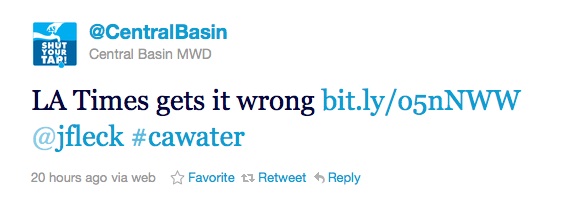In my automated news searches on California water issues, I’d run across a number of stories of late on a web site called “News Hawks”, which seemed to be devoting an inordinate amount of time to detailing the efforts of an obscure Southern California water agency called the Central Basin Municipal Water District. I didn’t spend much time on the stories, or blog them, because they frankly were pretty worthless in terms of advancing my understanding of California’s tough water issues – poorly written, obvious fluff.
I better understood why News Hawks was so interested in CBMWD’s activities after this LA Times story ricocheted around the water and journalism communities this week:
Readers who type “Central Basin Municipal Water District” into Google News get a series of upbeat articles.
One story hails the benefits of Central Basin’s new recycled water system. Another piece praises the agency’s legal battle over groundwater rights. Others catalog the successes of its conservation programs.
What the average reader doesn’t know is that Central Basin is paying nearly $200,000 in taxpayer money for the glowing coverage. In a highly unusual move, the water district hired a consultant to produce promotional stories “written in the image of real news,” according to agreements reviewed by The Times.
The story, backed up by documents published by the Times, nails CBMWD. Within a day, Google news had dropped News Hawks as a result. You would think that the agency, which can apparently afford pricey PR advice, would recognize the problem, fess up, and slink away quietly.
But no. CBMWD has become the gift that just keeps on giving, taking to twitter and the web demanding a retraction:
Mr. Allen’s story indicates that Central Basin has a contract with News Hawks Review…. In fact, Central Basin does not have a contract with the organization.
Well no, CBMWD, that’s not what Sam Allen’s story said. Here’s what Allen’s story actually said:
The articles appear on a professional-looking news website called News Hawks Review. The site is indexed on Google News, carries its own advertisements and boasts an “experienced and highly knowledgeable” staff of editors and reporters. But records show it is directly affiliated with Coghlan Consulting Group, the corporate communications firm under contract with Central Basin that pulled off this deal.
CBMWD’s call for a retraction misrepresents the part of the story they want retracted. Allen was quite clear that the contract was with Coghlan, and that Coghlan claimed the ability to place stories, for money, with its corporate affiliate News Hawk. So we’re clear on what’s going on, here’s the sales pitch that corporate communications firm made to CBMWD’s board:
A member of the Coghlan Consulting Group has been designated as a Google News Channel…. It is, in old media terms, like a weekly newspaper that is constantly in need of fresh and relevant content.
That “member of the Coghlan Consulting Group” is newshawksreview.com. And what does the CBMWD get for its money? Stories that show up “in the image of real news”. Coghlan is embarrassingly explicit in his pitch memo to CBMWD about the laundering to be done to make their press releases look like real news.
When I harped on this yesterday on Twitter, the CBMWD shared this with me:
No, CBMWD, reading your own documents clearly shows Allen got it right, and that it’s your retraction letter that gets it wrong.
Why am I so annoyed about this? Real journalists have enough of a problem as it is with weak and unethical actors in our midst who churn press releases, and with the frequently overblown allegations that result. For CBMWD and Coghlan and News Hawks to claim this is a legitimate business model is bullshit, and needs to be called out as such.


Horrors, the churn word!:)
More seriously, this is happening everywhere with every public policy issue. Schools of journalism also have PR tracks. Journalism does have a problem.
The LA times reported today that the author of the Central Basin stories is a stock photo. http://www.latimes.com/news/local/la-me-11-08-central-basin-20111108,0,6937547.story